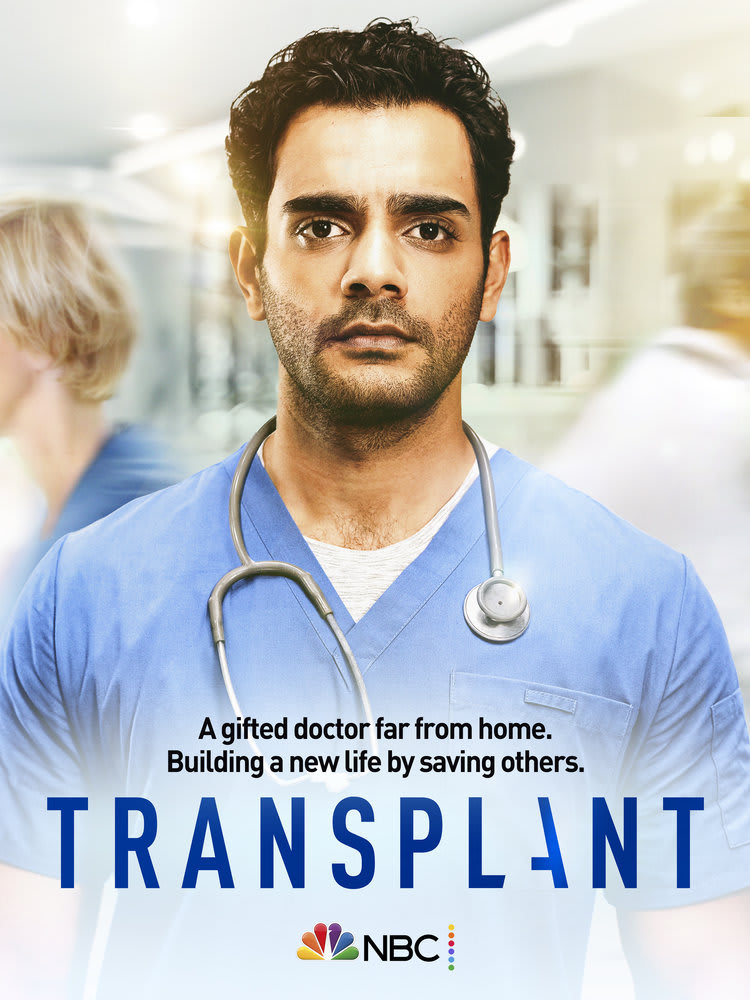by Craig Klugman, Ph.D.
With COVID-19 shutting down television and film production in the spring, U.S. networks looked north to find new content for their summer and fall schedules. One such Canadian import is the medical drama Transplant. Given the name, I assumed this would be a show about an organ transplant surgical team. However, the new refers to Dr. Bashir Hamed, a trauma surgeon who emigrated to the United States to raise his younger sister and escape the ravages of the Syrian civil war. In other words, Bash is the transplant. While working at a restaurant a car plows through the front window and he performs an impromptu surgery on Dr. Jed Bishop, the director of the most prestigious emergency department in Toronto (the fictional York Memorial Hospital). In return for his quick care and remarkable skills, Bishop hires Bash has an emergency resident.

While the show deals with the same issues as many medical dramas—huge tragedies (building collapse, gun shootings), personal relationships, difficult patients, and anti-heroes—what is remarkable in this particular show is how starkly it demonstrates differences between the U.S. and Canadian medical care landscape. For example, it may be a trope to say this, but everyone on the show is nice. They are polite and compassionate toward nearly everyone. When Dr. Mags Leblanc collapses from overworking, she is given a week’s leave and referral to counseling. There is an emphasis on the characters working hard and long hours, but also balancing that with a personal life. Early on the viewer meets surgical resident Dr. June Curtis who is supposed to be a career driven Black woman with a chip on her shoulder. But when a patient is in need, she is helpful. When someone asks her to do something, she does it. And since she is secretly dating a security guard with whom she is clearly smitten, we cheer for her. At one point she is challenged to provide care for a pediatric patient and although she stumbles, she does find a way to connect. There simply is no antagonist in this hospital drama.
Second, although there are moments of action (a gas explosion causes a downtown skyscraper to collapse and Bash runs off to help people, encountering flashbacks to finding his mother dead in her medical clinic after a suicide bombing), this is really a show about relationships. The connections that the residents have with each other, the attendings seeking a way out of loneliness, and between care providers and their patients. This is very different than a show like Chicago Med where patient’s wishes are ignored if they differ from a doctor’s aggressive recommendation.
Third, in eleven episodes, there are only two times where someone has asked if the patient had insurance. In one case, the patient was an undocumented immigrant and in the second case, the patient was visiting from China—two people who were not covered under the Ottawa insurance plan. In no other case did an administration waltz in and say “Stop! This patient is uninsured” or ask, “How is the patient going to pay for this surgery” or “is that expensive test really necessary?” If a doctor orders a test, it is done without question or asking how it is paid for. No patient is turned away from a procedure for lack of personal funds or employer-sponsored medical insurance. The provincial universal health insurance ensures that patients get the health care they need. In fact, there is not even a central “administrator” character in the show.
Fourth, some U.S. medical shows have dealt with patients asking for help in dying, but they are always shown as misguided or that it is a burden placed upon the health care provider. In Canada, assisted suicide is legal in all provinces, so when a patient with a terminal condition asks Bash for assistance, we see Bash struggling with it. After all, in his experience in war-torn Syria, lives are meant to be saved. Bishop tells him that this is a patient’s right and that helping a patient can mean helping them to find a peaceful death.

Because of Bash’s immigrants status, there is a continuing storyline of immigrant patients. One of Bash’s friends (from the restaurant) is undocumented and when he needs medical care, Bash tries to navigate the system to protect his friend from deportation. Rather than an administrator saying that they have to report him, or that they can only protect him within the walls of the institution, the attendings here work with Bash to make sure that good care can be given without risking the patient’s well-being. One might almost think that practicing medicine is about helping people rather than producing profits for the hospital.
I also wonder whether an Islamic, Arabic immigrant could have been the lead character in a U.S.-made television medical drama. In some ways, this show feels like it was created in response to anti-immigrant policies in the U.S. Bash forces us to see an Arab physician as just like everyone else—a highly educated, skilled, religious person who wants to do his job well and take care of his family. In the U.S. we have spent 4 years “othering” people with brown skin and trying to make them the scapegoats for our own mistakes and failings. Racism does exist in Canada, but transplants vision is closer to the Canadian tapestry metaphor, where differences are embraced in a cultural mosaic that composes character of the nation. This show is an example of that ideal—very different people, from varied walks of life coming together with the goal of helping others. American medical dramas usually follow a warped utilitarian morality where the outcome (saving the life; the doctor showing off skills) justifies the means. But in this Canadian import, medicine is a calling with a virtue ethics approach—being a good healer requires that you also be a good person and always be nice.